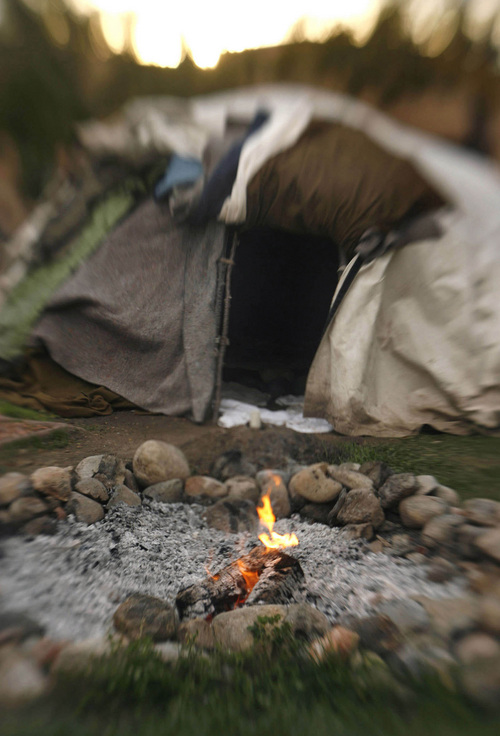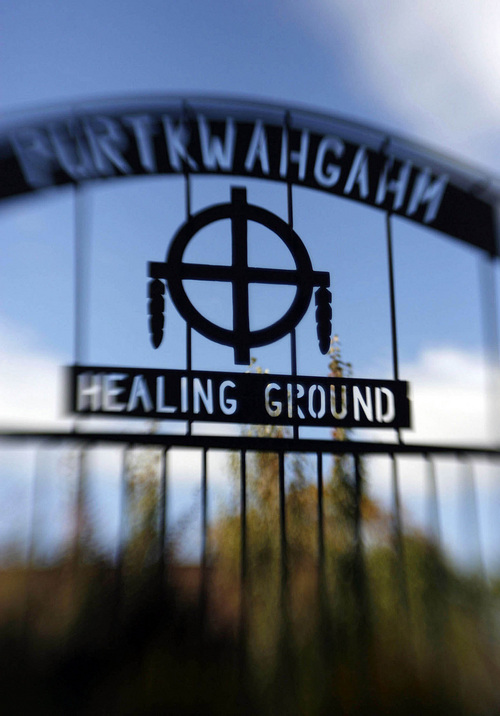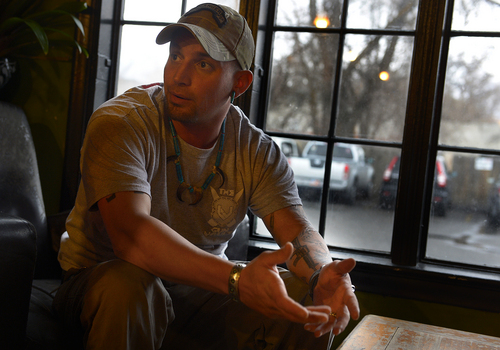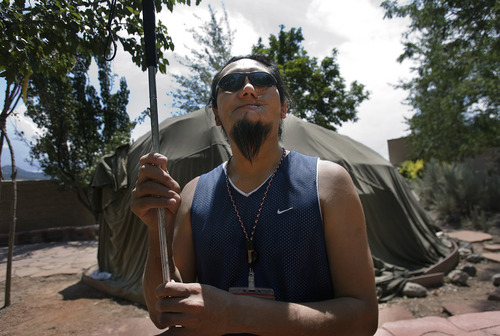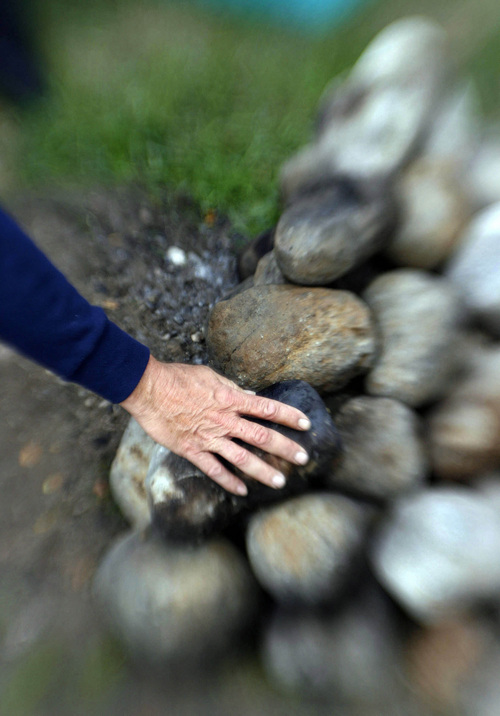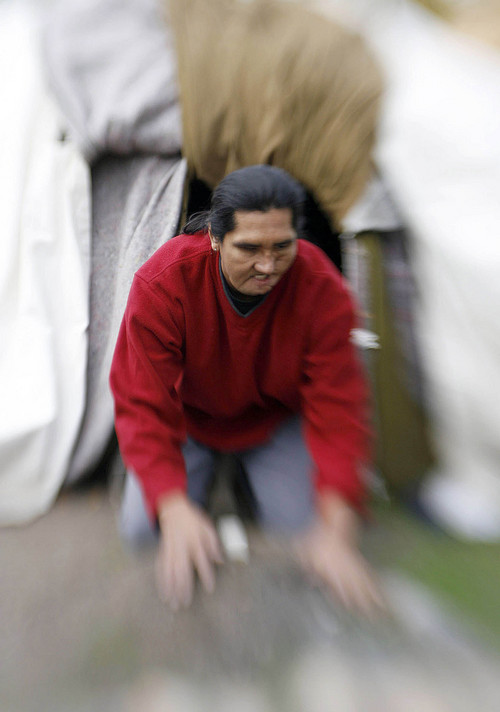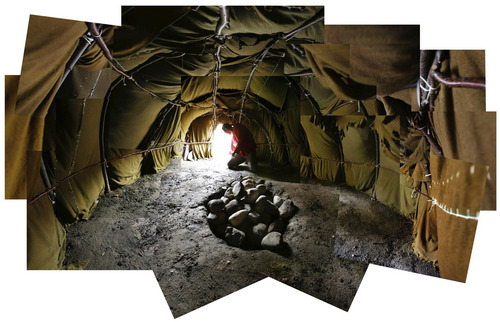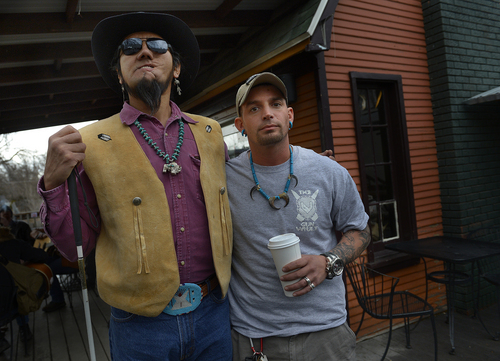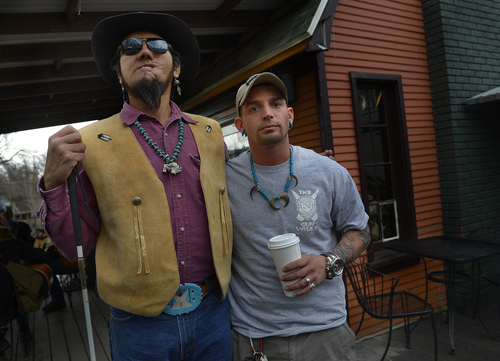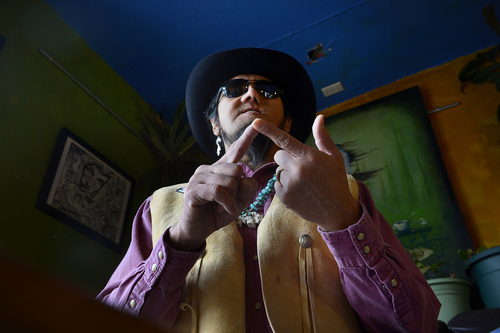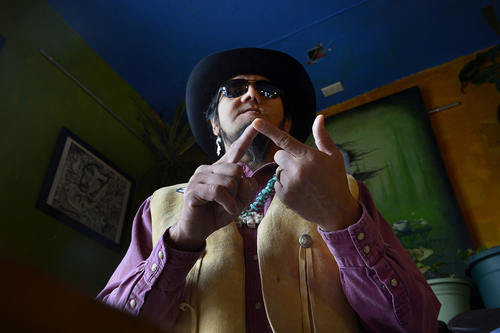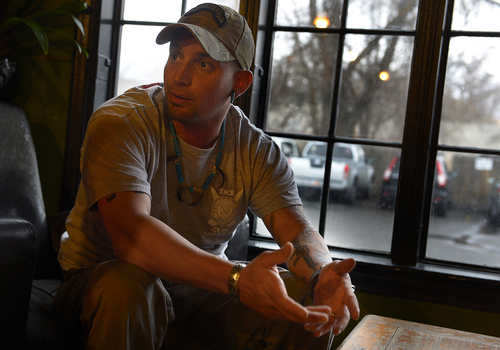This is an archived article that was published on sltrib.com in 2014, and information in the article may be outdated. It is provided only for personal research purposes and may not be reprinted.
On the third day of Cory Navarro's fast, another veteran walked into the sweat lodge and told him the director was there to see him.
Navarro had stopped eating soon after the leader of the American Indian sweat lodge program at the Salt Lake City veterans hospital resigned. Now Navarro, a 32-year-old former Army Ranger wearing only pants, scooted over to the sweat lodge door and sat on the ground. Outside the door, in a chair, sat Steven Young, the director of the Salt Lake City Veterans Affairs health care system, wearing a winter coat over his shirt and tie.
Young had been speaking to American Indian elders throughout the weekend, a VA spokeswoman said. All sides reached an agreement in a dispute over the use of sweat lodges at the facility that Navarro, Young and other veterans signed.
The agreement gives the American Indian veterans weekly sweat lodge ceremonies and everything else they wanted, except for one thing — the permanent return of the man who has officiated the sweat lodge ceremonies.
That man, Arnold Thomas, resigned Jan. 27, four days before Navarro began his fast inside the sweat lodge. In an interview earlier this month, Thomas said the head chaplain at the Salt Lake City VA wanted to reduce the number of annual sweats to 18 a year from about 45.
The VA has erected sweat lodges at their hospitals across the country, partly to provide religious services to American Indians. The sweat lodge also has been credited with helping veterans treat physical ailments and substance abuse.
Science has not yet supported those claims. Regardless, the "sweats," as veterans call them, have as much to do with spirituality as medicine.
Thomas saw the reduction as an attempt to end the sweat lodge program. He said there had been previous attempts, including an episode in the summer when the head chaplain refused to buy more wood.
"I finally reached a point where I had enough," Thomas said.
But VA officials insist they never wanted to diminish the sweat lodge program.
"On the contrary, it's going to enhance it," said Jill Atwood, a spokeswoman for the Salt Lake City VA. "We're adding some talking circles as well," referring to another American Indian ceremony.
Atwood said there were discussions only about how many of the sweat lodge ceremonies needed to be held every year, and when Thomas and veterans said they needed to be held weekly, administrators agreed.
Atwood said any discussions about changes were part of an annual evaluation every program receives to discuss how to improve. But Thomas, Atwood said, got mad and quit midway through the discussion with the Salt Lake City VA's head chaplain, Bruce Clapham. Atwood said people at the VA even asked Thomas not to quit.
Any concerns the VA had about the ceremonies appear to center on Thomas, who was conducting the sweat lodge ceremonies under a contract with the VA that expired Dec. 31.
Veterans supporting Thomas released an email sent by W.J. "Buck" Richardson, minority veterans program coordinator for the VA regional office that covers Utah. In the email, sent to Thomas and administrators at the Salt Lake City VA, Richardson suggests the VA is being "dictated to by" Thomas, who is "making rules up as he goes to fit his needs as he needs them."
Richardson went on to write, "The way it is now I get the sense that he feels he has the VA over a barrel."
Richardson declined to answer questions about Thomas, but told The Salt Lake Tribune no one who officiates American Indian ceremonies receives a salary. Some receive honorariums that reimburse their expenses, but many of the leaders refuse that. Atwood declined to answer some questions, saying the conflict contained an employment dispute.
Thomas, too, declined to answer some questions, saying he retained legal counsel and the VA was investigating his complaints.
Navarro, a Chiricahua Apache who was wounded when a bomb exploded underneath his vehicle in 2005 in Iraq, attended his first sweat with Thomas in 2010. He said the peace and prayers he received during the sweats helped him cope with his post-traumatic stress disorder and brain injuries.
"I swear to God, I felt a part of myself return," Navarro said.
Veterans from multiple tribes and those who are not American Indians participate in the sweats. Veterans also are allowed to bring spouses and family.
American Indians believe an ordained leader is needed to preside over the sweats and give blessings. Thomas, who is blind and bears facial deformities from shooting himself in the head with a rifle during a suicide attempt at age 18, was reared on the Duck Valley Indian Reservation of Idaho and Nevada. He has a master's degree in social work and is certified as a chaplain and a mental health specialist. He began leading sweats at the Salt Lake City VA in 2004.
In 2006, the VA agreed Thomas could conduct sweats weekly, he said. In 2011, he said, the VA invited him to apply to be a resident chaplain. In 2012, he began working under Clapham, a Catholic priest.
The Salt Lake City VA, through Atwood, declined to make Clapham available for an interview.
After he quit, Thomas went home and called a few veterans who were regulars at the sweats and told them what happened and that he would not be able to lead any more sweats. Soon, word made its way to Navarro in West Jordan.
"Now what the hell am I supposed to do?" Navarro thought. The sweats are "what ground me every week."
The next night, Navarro said he had a dream. He was in the sweat lodge, hungry and thirsty. Navarro said he believes dreams are important, and he decided to act upon his.
He called Thomas, whom Navarro calls "Uncle" out of respect, and asked for his blessing to pursue a fast in the sweat lodge. Thomas said he was in tears. He began leading the sweats to help veterans, and here was a veteran trying to help him.
"It made me feel proud," Thomas said. He gave his blessing.
Navarro said he didn't mean his fast as a protest.
"It was done with a good mind and a good heart," he said.
Navarro, his wife and a few veterans quickly created a group called Task Force 78, a reference to the American Indian Religious Freedom Act of 1978 that they say gives them the right to conduct the sweat lodge ceremony in a manner the veterans see fit. They sent fliers to other veterans saying their rights were being violated and announcing plans for a prayer ceremony.
Atwood said the VA received word of those plans and took precautions. The VA has its own police force. When Navarro, his wife and a few other veterans went to the sweat lodge Friday, Jan. 31, for Navarro to begin his fast, the VA's police officers were there.
They said the veterans couldn't have a fire. Navarro and the others found the ceremonial items they use during the sweats locked in the storage cage next to the lodge.
Navarro's wife, Kristina Navarro, said one police officer took her driver license and apparently ran it through law enforcement databases. She said the license was returned when the officer found no criminal record.
"There was a definite show of force," she said, "and almost what I would call scare tactics to try to get us to leave."
The officers went into a briefing, Cory Navarro said, then returned, unlocked the cage and left.
Navarro took some last bites of food and last drinks of water and entered the sweat lodge. Only he fasted. His wife and the veterans took turns keeping a fire going so the lodge was warm, though not as hot as it is during a sweat.
Atwood said VA director Young was in contact with the veterans throughout the weekend and had a meeting Monday morning with some of the leaders. Then he went to visit Navarro.
"I was expecting a real jerk to show up," Navarro said. Instead, Young was "real polite, very respectful of the ceremony taking place."
A few minutes later, all parties signed the agreement. But Young also told the veterans that the VA intends to put out for bid the contract to officiate sweat lodge ceremonies. The officiant must be a member of a recognized tribe, according to the agreement. Atwood would not confirm those plans.
In the interim, Thomas is being allowed to continue officiating weekly sweats. A sweat Friday night happened without incident, he said.
Thomas plans to bid for any contract.
Navarro said it's tough for veterans to build trust, and they trust Thomas and want him to remain at the VA.
"This isn't just for us, but the future," Navarro said of the sweat lodge program. "There's more guys coming home. We want this for them."
Twitter: @natecarlisle


